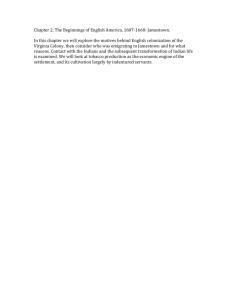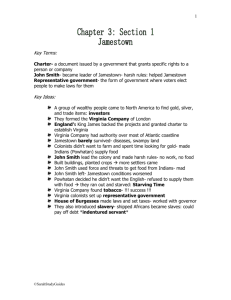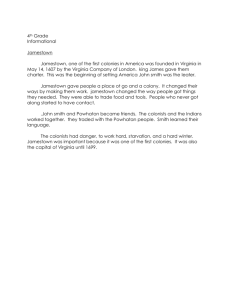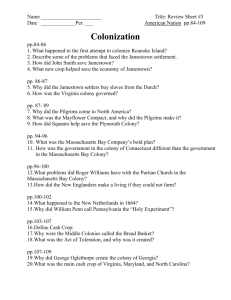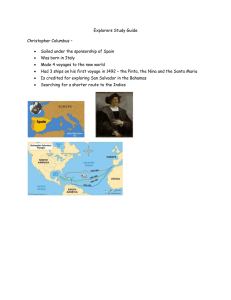American History—Chapter 1 and 2 Notes
advertisement
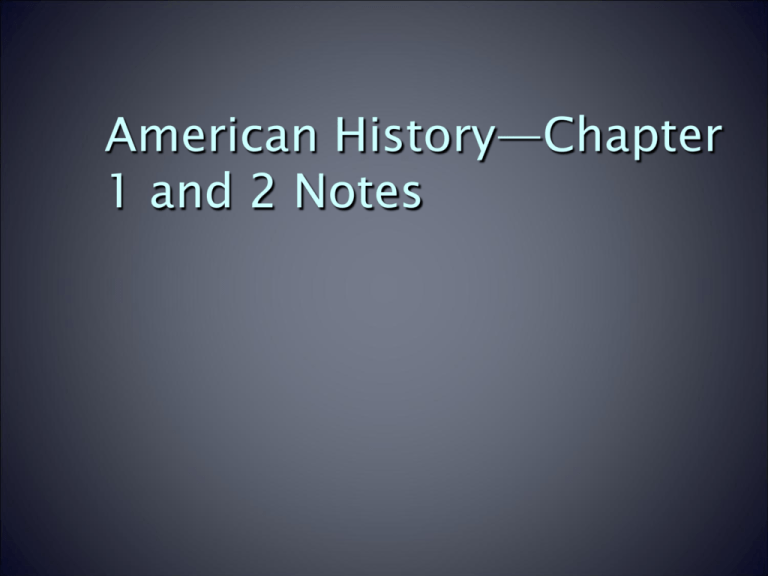
American History—Chapter 1 and 2 Notes Terms • Nomadic—groups of people who roamed from place to place in search of water and food. Did not develop any sort of agriculture. • Land Bridge—when Alaska and Russia were connected by land (Ice)…the first people to America walked across this bridge. • HoHoKam—first Native American group to become “civilized” by growing crops such as corn and beans. Land Bridge Aztecs • Located in Central Mexico. • Tenochtitlan— capital of their empire (located in the middle of a lake.) • Most powerful of all the Empires Aztec Map Other Great Empires • Mayan—built a large empire in Central America (Guatemala) • Inca—created a 2500 mile long empire that stretch through South America. • The Inca, Maya, and Aztec all • Built great cities, had huge palaces and temples, and a written language. • All 3 of these civilizations were destroyed by the small pox virus that was brought by Europeans. California Indians • Kashaya, Pomo, Yurok, Hupa were different tribes. • Adapted to the diverse climates of the area (coast, forest, desert)…used many natural resources. NW Coast Indians • Kwakiutl, Nootka, and Haida. • Use the sea as a source of food (whales, sea otters, seals.) • Noted for building totem poles and other elaborate ceremonies. Indians of the Southwest • Hohokam, Hopi, Pueblo. • Multi-story houses that were built into the sides of cliffs/caves. (Adobe) • Used irrigation systems to grow corn, beans, squash, melons. Eastern Woodland Indians • Iroquois (most powerful) • Lived and hunted in the wooded area east of the Mississippi River. • Lived in villages, blended hunting and agriculture together. • Formed communities…tribes worked together. Importance of….. • Trading—this was the main way different tribes communication with each other, along with how they transported goods. • Land Use—way of life for the Indians. Land was to be shared and worked by everyone…land was not owned, hence not for sale. • Religion—Natural World was filled with spirits that would help/harm people. The Importance of cont… • Kinship—strong ties between family members. This helped ensure that family customs would be passed down from generation to generation. Also, men and women had clearly defined roles in their tribes. • Division of Labor—dividing up the land and responsibilities according to gender, age, status. European Societies around 1492… Terms and Importance • Hierarchy—Social ordering by rank and class. Problem was that there was little chance to move up in class…economic opportunities of the New World gave some people hope. Also, most of the people of Europe were Peasants (bottom of ladder) • Nuclear Family—father, mother, children. This is what was important to the Europeans (much different than the Native American Kinship) Reasons For Exploration • Renaissance • Period of Time in Euro History (1400-1600) • People paid more attention to the world around them..human achievement became more important. • Crusades • Series of Military Expeditions to the Middle East (Spread Christianity) • Caused Europeans to increase trade with the Middle East…led t a strong desire for their goods and a need for an easier trade rou • Reformation • Split in the Christian Church (Catholic vs Protestant) • Caused people to want to move away because of Religious Persecution Reasons for Exploration • Growth of Commerce and Population • More people lived longer lives—a lot less land • More trade with Asia---more need for easy route • Rise of Nations • Portugal, France, England, Spain • These nations all wanted to be more powerful, so they wanted to find easier ways to trade • Renaissance • Sailing Technology • Compass and Astrolabe made it easier to travel around the world. • Able to sail against the wind Prince Henry • Prince of Portugal • Sent explorers to find a way to Asia. • Explorers sailed to and around Africa • 1400s • Started a Navigation School • Nick-name Prince Henry the Navigator Christopher Columbus • Was from Italy but sailed for Spain • Aiming for Asia by sailing West…but landed in the West Indies. • 1492—first trip • Started European trade with the Indies • Hero or Villain? Hernando Cortez • Spanish Explorer • Sailed to Mexico in 1519 • Aztecs thought he was a god..gave him gold. • Cortez was able to conquer the Aztecs because of the small pox virus Juan Ponce De Leon • Spanish Explorer • Sailed to the American SE (Florida) around 1513. • He was looking for Gold and the Fountain of Youth Francisco Coronado • Sailed for Spain • Explored the American SW in the 1540s • Was in search of El Dorado..city of Gold John Smith • English Explorer • Sailed to Virginia in 1606 • Established the first English Settlement (Jamestown) • Wanted to colonized America John Smith Columbus…hero or villain? • Hero • Explored the West Indies • Started Colonization • Started Trading with Africa/Europe/N America • Villain • Started Colonization • Greedy—Killed and Controlled the Natives • Slavery—natives then Africans • Killed Thousands by disease Leading Towards Slavery • Spanish first enslaved the Natives…Natives worked until they died or ran away. • Then African Slaves were used when the Natives died. • Slave trade brought big money • Trade slaves for spices and sugars • Encomienda Resisting the Spanish • Best option was to move away. • Some natives tried to fight back in protest, very rarely was this successful. • Spanish were “supposed” to try to convert the Natives, in reality they used them to look for gold that was not available. Terms • Pinta—Columbus’ ship that landed on the mainland (Nina, Santa Maria) • Hidalgos—Spanish people that came with the explorers to help set up basic civilizations. • Colonization—establishment of distant colonies by a parent country. Usually these colonies gave the parent country many natural resources. Terms cont.. • Conquistadors—Spanish Explorers that were looking for gold. • New Spain—name for the Spanish colony in America. Mexico City was Capital. • Encomienda—economic system in which Natives worked for the Spanish in return for the opportunity to learn Christianity. English Settlements in America • John Smith—Englishman who sailed to Jamestown, Virginia. • Jamestown • First English settlement in America • April 1607 • Joint-Stock Company—people would pool their money together to fund a trip to America. How Jamestown got started. Jamestown • Jamestown got off to a bad start • Climate was not good for growing food • Lots and lots of disease • Indians started to kill livestock • 60 of 600 survived • Jamestown turns the corner • New leaders made people work • Began to grow tobacco!!! Economy of early Virginia • Tobacco was very popular in Europe • Headright System—anyone who paid for their own land or paid for someone else to come to Virginia would receive 50 acres for free. • Indentured Servants—people that came from Europe to work on the tobacco plantations • If they worked for 7 years they would be able to own their own land • Caused a lot of people who were in bad economic shape to move to America • Before long, there was not as many indentured servants so African Slaves were brought over to work the land (Native Americans would run away) Bacon’s Rebellion • Over time, the poor people of Virginia were forced Westward • Those people were taxed more and had to deal with constant Native American Attacks • In 1675, western settlers fought a series of battles against the Native Americans. Bacons Rebellion • The western farmers became upset at the governor of Virginia over lack of help fighting these battles. • Nathaniel Bacon • He hated Native Americans and was upset at the governor (Berkley) not helping • Bacon and his followers went to Jamestown to protest many things (lack of help, no representation, etc) • Protest turned violent, many buildings were destroyed. • Virginia changed some of its policies and it set the precedent that rebellion was a way to get things done in the colonies. New England Terms • Puritans—people who wanted to “purify” the Church of England • Separatist—Puritans known as Pilgrims that came to America to escape persecution and start a new life. • John Winthrop—first governor of Massachusetts • Wanted to create a “city upon a hill” or a colony that everyone would want to be like New England Terms • Plymouth Colony—first colony founded by the Pilgrims in 1620. • Massachusetts Bay Colony—in 1630, Pilgrims set up a larger colony….Boston would be the capital. • Government and the church would be ruled by the same people. The church was center to the lives of the people Differing Views for Puritans • Roger Williams • He did not think that religion should be forced on people. Also wanted Mass. To be more democratic. • He also did not like how the early settlers were taking land from the Native Americans. • He was kicked out of Mass and started a new colony called Rhode Island • Anne Hutchinson • She claimed that the holy spirit lived in the hearts of believers and that people did not need the church/govt. to be religious. • She eventually moved to New Netherlands (New York) b/c the Dutch were more tolerant Indian Wars • Native Americans had differing beliefs about land ownership..this caused many conflicts. • Pequot War • 1st major conflict in Mass • Colonist and another Narragansett Indians destroyed an entire Pequot Village • Around 600 Pequots were murdered..this led to Narragansett to not like the English • King Phillips War • Indians used hit and run tactics to destroy many towns • The settlers were finally able to defeat them • This was the last real Native American threat in the New England Middle Colonies • William Penn • Founded Pennsylvania • He was a Quaker (peaceful group) • Gave religious freedom, voting rights, and land to all people who moved. • They had very good relationship with the Native Americans. • New Netherlands • Dutch settled this area, major city would be New Amsterdam (NYC) • Peaceful, tolerant • Taken over by England and renamed New York • Also split the land (New Jersey)
